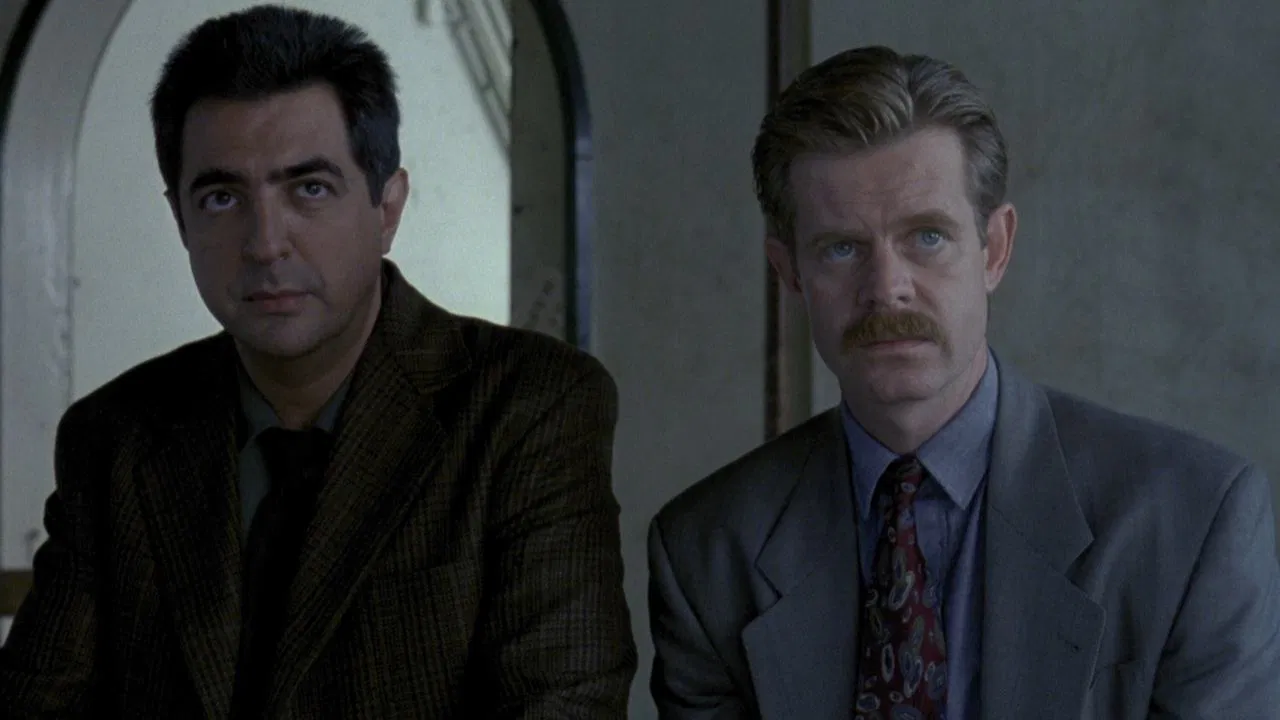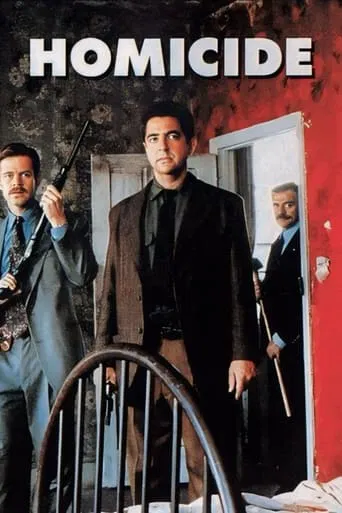

The two criminal investigations that are launched early on in this crime drama provide the backdrop for an even more powerful story that unfolds as a homicide detective becomes embroiled in a journey of self-discovery that leads to his downfall. Issues of race, religion and loyalties suddenly loom large as he tries to come to terms with his own identity and in the process, loses his objectivity and his professionalism. The consequences of his actions then prove to be far more devastating than he could ever have imagined as he gradually comes to recognise "the nature of evil".As Homicide Detectives Bobby Gold (Joe Mantegna) and Tim Sullivan (William H Macy) speed through the streets of their city on their way to speak to the brother-in-law of a dangerous drug dealer/cop killer, Gold feels highly motivated because he knows that if they can apprehend Robert Randolph (Ving Rhames), they'll gain plenty of kudos and recognition, not least because this particular criminal had previously humiliated the FBI by escaping their clutches, even when he was massively outnumbered by them The detectives' journey gets interrupted, however, when they come across another crime scene and Gold discovers the dead body of an elderly Jewish woman behind the counter of her candy store which is situated in a black ghetto.Gold's frustration about being delayed in his pursuit of Randolph soon heightens after he gets assigned to the murder case because the victim's son, who happens to be a wealthy doctor with friends in high places, was able to pull the necessary strings to make this happen. The doctor's motive for doing this was because he believed that, as a Jew himself, Gold would recognise that the murder was a hate crime rather than simply a "robbery gone wrong". Gold, who's first and foremost an honest cop, tends to believe that he's dealing with a straightforward murder case and initially regards the victim's family as rather hysterical and paranoid.In his subsequent dealings with the Jewish people he encounters, Gold is regularly patronised, treated contemptuously and repeatedly urged to abandon his normal neutrality and do whatever is needed to protect his own people. As Gold is a non-practising Jew who has never previously felt particularly Jewish, he starts to think more deeply about where his loyalties should lie and as well as starting to believe in the existence of a conspiracy, allows himself to be recruited into a militant Zionist group with whom he participates in the bombing of a property which is being used by a Neo-Nazi group. The group that he'd worked with then use his commitment to their cause to blackmail him and the slippery slope that he finds himself on, eventually leads to him being given a knowing glance by a man who, some time earlier, at a time when he wasn't interested in listening, had offered to tell him how to solve the problem of evil.Joe Montegna does a fantastic job of making his character's malleability seem credible and is even more accomplished in the natural way in which he looks so ashamed when Gold suddenly realises that an anti-Semitic rant he'd indulged in had been overheard by a member of the doctor's family. William H Macy is perfect as Gold's Irish partner who keeps his feet firmly on the ground at all times and Ving Rhames makes a strong impression in his important supporting role.The movie's story is told with great precision, intensity and pace and the kind of mesmeric quality that's a familiar feature of David Mamet's work. It's fascinating to watch and for some unaccountable reason, despite its numerous merits, still remains criminally under-appreciated
... View MoreAfter an excellent start, the movie took an unexpected turn for the worse starting around the break-in scene to this nazi (deliberate lower-case spelling) store. So I ended up with mixed feelings even after having read numerous reviews and after re-evaluating my initial impressions.I love David Mamet so I don't have the heart to give a low rating because I don't want to spoil the average.Now I come to my biggest gripe. Joe Mantegna is a superb actor who shined in, e.g., House of Games by Mamet but he is miserably miscast here. You see the truth is that no gentile can ever play a real Jew, not even a secular one. Well, there is one exception to this rule I am aware of, namely, Armin Mueller-Stahl. I can also imagine Robert De Niro playing a Jew (he did more than once) but even that is a stretch. Joe Mantegna? No way. Even Rebecca Pidgeon who is a converted Jewess in real life is out of place here.Anyway, despite not liking this movie and even some of his other ones as well, David Mamet remains one of my favorites.
... View MoreA 1991 film, "Homicide" opened the careers of two very important stars: William H. Macy, and Ving Rhames. A very under-rated and seldom-seen Joe Mantegna stars as Detective Bobby Gold, who works for an unstated northeastern police department that looks every bit like Baltimore PD. The department is after the killer of two cops. The FBI attempts to arrest the suspected killer (in a wonderfully understated, quiet but efficient initial scene) but manages to let him vanish. The heat is on the mayor's office and politics rage. Det. Gold is called a "kike" by one of the mayor's black handlers. In the process of tracking down the cops' killer, Gold manages to get himself involved in the homicide of an older Jewish woman killed in her store. Was she the target of everyday thugs, or the mark of someone continuing the Jewish pogrom? Mamet shows the policemans mindset in many ways, first by showing racial slurs hurled at him by a angry black city worker at the start of the film, but then later on in the film he meets a hasidic jew who when he tell he can't read Hebrew says "then what good are you". after the policeman is heard making anti-semitic remarks himself by a family member of the case he is working on he goes all out to find the killer, when in actuality they don't care about the homicide at all, but a list that was in the care of the deceased, a list that could expose some of their illegal doings in Israel.Overall rating: 8 out of 10.
... View MoreStrong performances by Joe Mantegna, William H. Macy, and others, somewhat offsets the hard to swallow script. Intelligent dialog permeates the film, and it does not lack action. What appears to be missing is an appropriate ending that ties up the many dangling plot threads. "Homicide" has a strong undercurrent of unanswered questions that will gnaw at the viewer following the rushed conclusion. Torn between two investigations, Mantegna's character is pivotal, and in the end his decisions seem neither logical or likely. Nevertheless, "Homicide" is far better than most police drama's and worth seeking out for the fine performances. - MERK
... View More